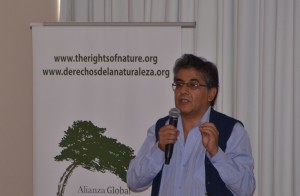Creating a Livable Planet: The Rights of Nature Movement
Feb 2nd, 2014 | By admin | Category: Environment/Sustainability, FeaturedBy Suzanne York, www.howmany.org
Corporations, law, and governments often operate as if nature is something only to be exploited for its abundant resources. Little thought is given to what this might mean for the global ecosystem, let alone for future generations.
In mid-January, the Global Alliance for Rights of Nature hosted a thought-provoking conference in Ecuador on promoting the concept of nature’s rights. Sixty attendees from around the world came together to strategize and advocate for a forward-thinking approach to protecting people and the planet.
Rights of Nature
Rights of nature is a holistic movement, much of it based on indigenous wisdom, and offers a positive vision for the world today. It acknowledges that:
- nature in all its life forms has the right to exist, persist, maintain and regenerate its vital cycles;
- people have the legal authority and responsibility to enforce these rights on behalf of natural ecosystems;
- an ecosystem itself can be named as a rights bearing subject.
Ecuador is the first country to recognize rights of nature in its national constitution.
“We are making Earth unlivable for both humans and nature” said Alberto Acosta, president of the Ecuador’s Constituent Assembly that enacted the country’s 2008 constitution that included rights of nature. He went on to say that the world “needs to take steps on the decommodification of nature.”
Rethinking how and what society takes from nature is critical in a world of over 7 billion people and an ever-growing population of consumers.
Systems Change
According to Pablo Solon, former ambassador to the United Nations for Bolivia and executive director of Focus on the Global South, we need to build the basis of a world movement of systematic change, based on a new relationship with the earth and that includes a new economy that supports life. “If we don’t change the relationships of global forces, nothing will change”, Solon said.
This point was reiterated by many others, including Vandana Shiva, an Indian physicist and eco-feminist, who stated that “we often ignore the fact that the model is collapsing.” And Tom Goldtooth, founder of the Indigenous Environmental Network, told conference goers that a social movement for systematic change is needed to support rights of nature, and ultimately, we must “break away from a system that doesn’t recognize us.”
Ruling in Favor of Nature
The conference ended on a promising note with a mock public tribunal on the Rights of Nature and Mother Earth. A ten-member international panel of judges, headed by Shiva, heard nine rights of nature cases and ruled on each case’s admissibility for adjudication at a future tribunal.
The cases included the BP Deep Horizon Gulf oil spill, the Chevon/Texaco oil contamination case in the Amazon, the endangerment of the Great Barrier Reef by coal mines, hydraulic fracturing, genetically-modified organisms, and climate change.
The tribunal will become a permanent global body for defending nature’s rights; the next one will likely be in Peru in early December 2014 for the United Nations climate meeting.
It is obvious in the face of ongoing environmental degradation that what we’ve been doing the last few decades isn’t working. Rights of nature represents the profound shift in our global society that must take place if we are to leave behind a sustainable planet with healthy communities for future generations.



